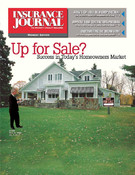A host of personal lines issues—ranging from credit scoring to a commissioner-requested data call to state fines on drivers with no proof of auto insurance—headlined the Michigan Association of Insurance Agents (MAIA) convention last February and have been in the news since then.
MAIA has initiated a bill that would restrict insurers’ use of credit, but it has yet to be voted out of the Senate Committee on Banking and Financial Institutions. Senate Bill 884 closely tracks the National Conference of Insurance Legislators’ (NCOIL) model bill, a consensus approach agreed to by politicians, insurers and agents which has received insurers’ support in at least 15 states.
Insurers in Michigan, however, have been reluctant to sign on to MAIA’s crusade. During a panel at the convention, Citizens Insurance CEO Mike Britt expressed reservations about the bill.
“The terms of NCOIL are inapplicable in Michigan,” he said. “We’re a little nervous about it being attached to chapter 21 of the insurance code. There are other issues too.”
Without insurers on board SB 884 seems to have stalled, in spite of Office of Financial and Insurance Services (OFIS) Commissioner Linda Watters’ support for some kind of reform. Watters, who spoke at the convention, said key elements of any credit-based insurance scoring reform included transparency and fair treatment for those with little or no credit as well as tragic life events that resulted in enormous medical bills. These elements are encapsulated in SB 884.
Watters also said that the OFIS was not convinced of the actuarial justification for using credit scoring in underwriting and rating, and that a ban had been considered internally. She said she hopes to have the department’s official position finalized before the end of 2004.
In the meantime, MAIA Executive Director Robert Pierce expressed exasperation at the carriers’ refusal to get on board the agents’ proposal.
“We’re puzzled by why some companies have reacted the way they’ve done,” Pierce told Insurance Journal. “We have a number of these companies who do business in other states that have already passed the NCOIL model or are getting close to it. They are successfully doing business in those states. But for some reason in Michigan they are unwilling to accord their agents in this state the same protections they have in other states.”
Gathering data, making hay
While credit scoring has been an issue of major concern to agents in Michigan, rising auto and homeowners insurance premiums—and the disparity between rates between urban, suburban and rural areas—has become a political hot button. In response to outcries from Detroit-area politicians, Democratic Gov. Jennifer Granholm and Watters made a joint announcement that OFIS issued a call for insurers’ data related to auto and homeowners rates to examine whether the rates are justified by loss experience and whether the geographic rate disparity is justified.
The information is not currently collected, Watters told the convention’s attendees in her speech, and she elaborated on the reasons for the data call in an interview with IJ.
“The complaint rates have increased in the last five years,” she told IJ. “There’s no major impetus for this except that consumers are complaining every day. They’re calling and writing. It’s real. It’s not something they’re being told, but something they’re experiencing for themselves.”
When asked about a finding by the Insurance Institute of Michigan—an industry-funded lobbying group—that auto insurance rates had risen only 7 percent in the state versus 8.5 percent nationally, Watters said averages didn’t tell the complete story.
“I’m not really focused on the data the institute produced,” she said. “We have to produce a study independent of that. We need to peel back the layers and look at the details. When a consumer tells me that her rate was $860 last year and $17,000 this year that’s something I have to investigate.”
It’s unclear what may come out of the investigation. A report is likely to be released by late summer, according to Watters.
“There could be a wide range of recommendations,” which depend on OFIS’ findings, Watters said. “I’m not clairvoyant.”
Oops! They did it again
Meanwhile, Michigan is reconsidering legislation it passed last year to fine drivers without proof of insurance up to $300 after receiving angry complaints from some of the 32,000 drivers who claimed to have insurance but were sent notices in the mail anyway.
The state Senate voted 32-5 in mid-March to do away with the fine, which was intended to kick in only when drivers had accumulated a number of points on their licenses for offenses such as driving without a license, driving without proof of insurance and so on.
The bill must still go to the House. Gov. Granholm has announced she intends to sign the bill should it reach her desk.
Was this article valuable?
Here are more articles you may enjoy.


 Lawyer for Prominent Texas Law Firm Among Victims ID’d in Maine Plane Crash
Lawyer for Prominent Texas Law Firm Among Victims ID’d in Maine Plane Crash  Married Insurance Brokers Indicted for Allegedly Running $750K Fraud Scheme
Married Insurance Brokers Indicted for Allegedly Running $750K Fraud Scheme  Former Ole Miss Standout Player Convicted in $194M Medicare, CHAMPVA Fraud
Former Ole Miss Standout Player Convicted in $194M Medicare, CHAMPVA Fraud  Trapped Tesla Driver’s 911 Call: ‘It’s on Fire. Help Please’
Trapped Tesla Driver’s 911 Call: ‘It’s on Fire. Help Please’ 


